We don’t say the F word around here. I’m not saying we don’t cuss, I do that plenty! But I’ve heard about far too many RV Fires to jinx us and risk one by simply mentioning it here. And then it happened to us, almost…
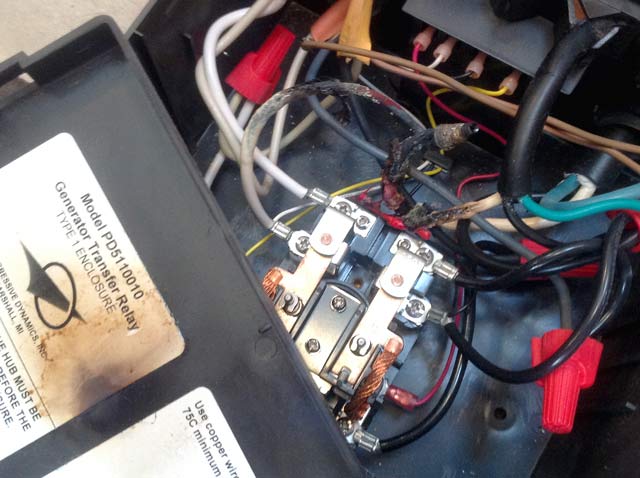
How We Avoided Our RV Fire Catastrophe
The sound of that just makes me cringe. The smell was even worse.
One day not too long ago we turned on the air conditioner and Rene said she smelled “something electrical”. I didn’t smell it at first, but promised to look into it. And I planned to do just that, eventually.
More recently, we came home after running errands all day around Las Vegas. We opened up the rig and it was all hot and stuffy inside, so I turned on the A/C. That time I smelled it, right away. The distinct acrid smell of an electrical fire appeared to be coming from the air conditioner vents.
Rene panicked, and I became immediately concerned. Yes, there is a difference. And yes, there was valid cause for both.
She quickly climbed up on the roof to check out the air conditioner from the outside. I immediately turned it off and noticed the air had become foggy—not a thick cloud of smoke like something caught on fire, but clearly something about ready to do just that.?
The source was definitely electrical. So I started inspecting the wires up in the air conditioner. Rene had joined me again. She noticed the smell getting worse and started opening all the windows. We started worrying that there may be a fire in the ceiling, so I turned the central fan on (not the A/C) to see if any smoke came out the vents. There was none.
I turned off the fan, and that’s when we lost power.
It was late. We were celebrating the end of a week long, exhausting, successful exhibit at a major veterinary conference. We were parked in downtown Las Vegas with full hookups. And we were now boondocking.
Steps to Identify RV Shore Power Problem
After confirming we were not in danger, we calmed down a bit and I planned to investigate further in the morning. I started searching for decent RV shops nearby and mobile RV mechanics with positive reviews. But I wasn’t about to pay for the first hour of anyone else tearing our home apart to identify the problem—not when I know my system well enough to do that.
First, I immediately unplugged our RV from shore power and turned off the electric water heater. After checking that the loss of power was not a thrown breaker, that is. It wasn’t.
I checked the GFC (Ground Fault Circuit) to make sure that hadn’t just tripped. It had not. And I checked the breaker at the pedestal.
I turned on our inverter, and we had power! That was my first clue to the cause. Anyone with me yet?
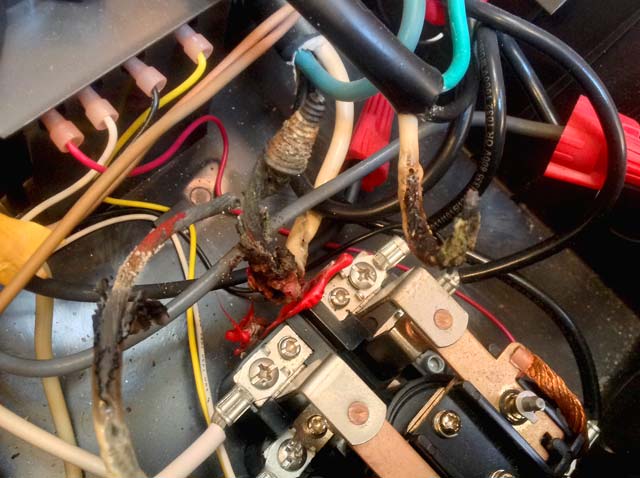
Yup, when I noticed we had power from the inverter but not from shore power, my first guess was that the transfer switch had fried. That’s the technical term for gone on the fritz. Fry it did, and it had apparently frizzled a bit too. For the record, when I opened the box and saw that mess, I did say Fuuuuuck… A few times actually—mostly in awe though, not in anger.
I was incredibly grateful that this fritz wasn’t any worse. I really don’t care to imagine how bad this could have been. And I was thankful that the fix was pretty simple. Let’s take a closer look at that mess…
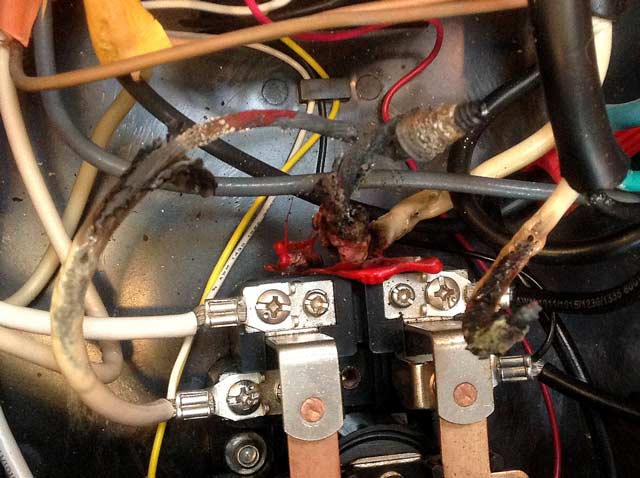
Notice how the three white (Neutral) wires inside the transfer switch box had come apart. That melted red glob is—or was—the connector.
By trimming the burnt wires and and reconnecting them securely, I was able to fix the problem. I tested everything by running the microwave, turning the water heater back on, and switching back and forth between shore power and our inverter a few times.
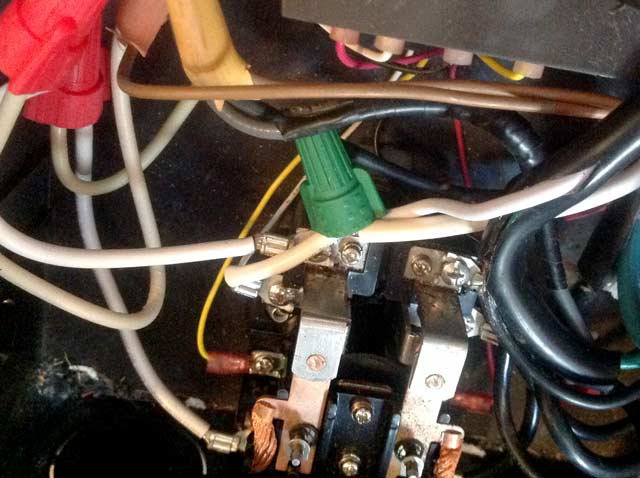
I don’t think this close call had anything to do with the air conditioner—other than its sudden large power draw being the final straw that broke the poor connection’s back. We’ll test that theory some other time in a more opportune location. (I’m writing this at The Pads, one of our favorite spots for boondocking near Death Valley.)
So, you may be asking why we thought the smoke was coming from the air conditioner vents. Well, for starters, the smell only occurred after turning on the A/C. And, the intake for the air conditioner is in the ceiling almost directly above our Power Distribution Center where the transfer switch is located. That’s a good thing—the air conditioner was drawing the smokey air up, allowing us to quickly identify the problem and associate the cause.
RV Electrical Problem Troubleshooting Tips
- Listen to your wife. Listen to your husband. Listen to your domestic partner, your kid, or your dog. Just listen. If ANYONE in your RV suggests there may be a problem, especially if has anything to do with a potential f***, stop, listen and pay attention.
- Smell. If you suspect a f***, and it smells electrical, the source is likely somewhere near wiring connections. You’ll find the most connections in your? electrical distribution box.
- Check all breakers. Turn all breaker switches on and off, including those on any GFC outlets.
- Eliminate overloaded circuits. If you have a breaker switch that frequently trips, the circuit is overloaded.
- Check your RV Transfer Switch. If you have solar power with an inverter and/or on-board generator, see if your transfer switch is still operational. If you have inverter power but no shore power, the transfer switch has likely failed.
- Check for loose wiring. Loose electrical wiring connections cause heat. They can arc, and sparks are bad anywhere.

How to Prevent an RV Electrical Fire
That loose wiring part is a big deal. At least it was in our case. When I rewired the Neutral connections in our transfer switch box, I taped the connector to ensure it remains in place. I also loosened the clamp holding the main power cord so I could pull some more slack into the box, preventing the wires from being pulled to tight. And yes, I tightened the cord clamp back down.?
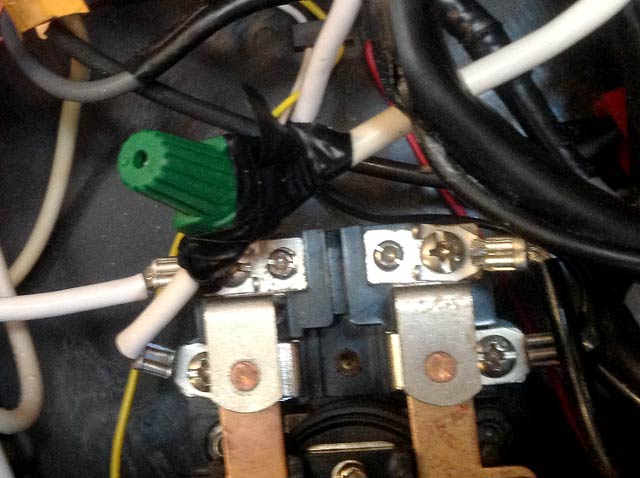
All RVs tend to bounce around, a lot. The more we travel, the more things inside our RVs will bounce around. This goes for your books, your dishes, your plumbing, and your electrical wiring. I’ll be adding an inspection of our main power connections to my regular maintenance routine as a result of this close call, for sure!
Epilogue:
Fortunately, we have not experienced too many near RV catastrophes like this. (One is too many if you ask me!) I say “another” close call in reference to the time we barely missed getting flooded out of an RV park in Texas. Oh, and a couple RV tire blowouts that could have been much worse. Have you escaped serious trouble in your travels?
Last night at 2:00 am I awoke to a strong burning smell like plastic melting in our 2019 Forest River 5th wheel model 36BHQ
I turned off air conditioning and inspected the rest of the RV.
Smell seemed only in upper bedroom in the nose.
I opened windows but the smell got stronger.
By the time I dressed there was a haze of smoke in the room.
I immediately got everyone outside, turned off the propane. There was a lid popping noise coming from behind the wall in the first storage compartment by the door.
The inverter in that compartment was cool, turned off but plugged in. The small refrigerator also in that compartment was cool and unplugged.
I immediately disconnected the electrical power and the popping stopped.
I opened the second storage compartment under the nose and it was filled with smoke.
I checked the batteries and all wiring that I had access to but everything was cool and intact. All 110 outlets both inside and outside were fine.
The batteries had been in the charge position so I turned that off.
The smoke had originated in that first compartment under the nose where the front bedroom is.
Scared to think what could have happened had I not woken up.
I live in our RV while we are traveling through the east coast as we are equestrian trainers and we compete.
How do I figure this out and what are my options?
Thanks
Scary. Good job acting quickly there! Sounds like some serious inspection and electrical troubleshooting is necessary. If you are uncomfortable with that, please seek professional assistance. Good Luck!
Jim —
Interesting almost disaster. At present we have our 2019 Rockwood Ultra Lite 2606 travel trailer at Camping World getting looked at for a potential fire hazard. We were on the road, not plugged into shore power, and stopped for lunch. When we entered the trailer we both thought we could smell something electrical. My husband thought he saw a whiff of smoke. The smell was near the entryway, near the thermostat and a bank of switches for slides, etc. He opened up the thermostat and everything looked fine behind there — nice neat wiring, no damage. That night we swept the floor in the entryway and saw two burn marks on the linoleum. We don’t smoke and we have not been anywhere near a campfire. The Forest River Forum contributors guessed everything from a staple through a wire causing an arc, to some random construction debris catching fire in the thermostat and dropping onto the floor through the bottom vent to the thermostat, to sunshine coming through the window and bouncing off the bath mirror and beaming onto the floor. One man wondered if the outside steps, which fold under the camper right at that spot, were to blame. (Forest River has changed their steps on 2019’s built after ours.) Our camper was two days out of warranty when this happened, but it is currently at Camping World in Conway, NH under our extended warranty plan, getting looked at. So far they have found nothing burned anywhere except the top layer of the linoleum, in two spots several inches apart, in a direct row. They have called Forest River and are awaiting their input. They haven’t pulled the linoleum up yet but say there are no wires under there. I’m thinking they should pull the underbelly covering down and see if they can see any wires pierced by a staple. Any thoughts? I’ve just downloaded “Fires Originating in Branch-Circuit NM Cables due to Installation Damage” off the Internet and scared myself silly.
Scary! Could be ghosts…or a smoking intruder.
I’d be looking underneath too. Or, would there happen to be a wired smoke detector on the ceiling directly above the marks?
Close call!
Glad you are ok ?
Thanks Patti. We are too.
Whew! Close call. Glad you guys are ok! Our transfer switch problem was not nearly as bad; it just wasn’t switching to generator power.
Hi Jim. Great story, and a close call. Glad you were on top of it.
One quick correction: The melted wires shown are neutrals, not grounds. Big difference. The neutral is a current-carrying wire, and it’s that current which caused the melting, through a process known as ohmic heating. Most likely, the wire nut was not fully secure; perhaps it vibrated loosed over time. That’s a source of high resistance, and when you run high current, such as from air conditioners, through a high resistance, ohmic heating is the result. Similar ohmic heating issues are often found on shore power connectors as the contacts wear or loosen over time, and I’ve seen more than one melted shore plug over the years.
Good catch, thanks Sean! Correcting that now…
We had a close call, too! And like you, the culprit was fscking wire nuts:
I had turned on our bathroom water heater (electric) so i could take a shower later in the day. We often do this mid-day to take advantage of excess solar power. We also, very often, do this and then leave the trailer for the afternoon. Luckily, this time i stayed home. About 20 minutes into the heater’s operation, i heard crazy sounds coming from the bathroom. A mix of fingernails-on-chalkboard and squeak-crackle-sizzle. It was too fast for me to smell anything. I was reasonably quick in figuring out the issue and getting the breaker thrown — luckily the breaker panel is arms-reach from the water heater. Our fault happened in the junction box on the water heater, where incoming power ties to the wires for the heater. I had made the connection with wire nuts, and I had electrical-taped them too…but they shorted anyway. Fundamentally, this was my fault. I know that i was tired as hell when i installed that thing and i probably didn’t twist the leads very well before putting on the nut. Also wire nuts are not really the right thing to use in an RV (doesn’t stop the manufacturers from doing it though). I really should have used proper crimp-on connectors.
Here’s the thing though — the BREAKER NEVER TRIPPED. This kind of fault is /exactly/ what a breaker is supposed to protect against. A short should pull high current, and the breaker should see that and pop. It takes a few seconds, but not as many seconds as i spent trying to find the problem before throwing the breaker manually. This was a scary realization. I verified that the breaker was correctly sized for the circuit — 15A for a 1500W (12.5A) heater on white (15A) Romex is correct. So then i tested the breaker itself, and found that *it was faulty*. Now THAT is scary! The trailer is a 2001 and when we rebuilt it i reused the original breakers…but evidently at least one of them had aged. So after trimming, cleaning, and securely re-wiring the water heater, i went ahead and replaced every single breaker in the distribution panel, too.
Great points! Thanks for sharing.
Scary indeed. 😮
You didn’t mention so I don’t know the manufacturer of your transfer switch, but from my experiences with the Yahoo Monacoers Board, there is a well-known fire hazard with Iota transfer switches. I just purchased a replacement to finally plug that safety hole.
Thanks for the warning Ronald! What replacement switch did you get? Ours is a PDI Transfer Relay (Progressive Dynamics).